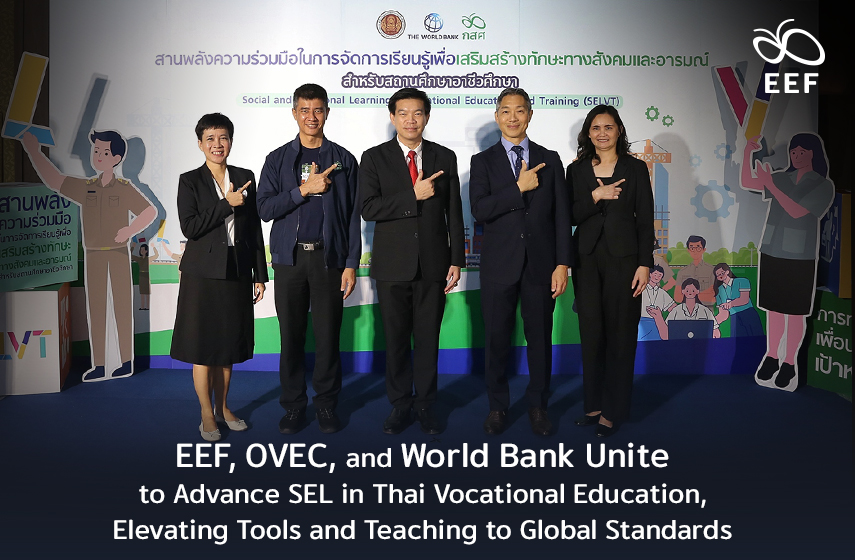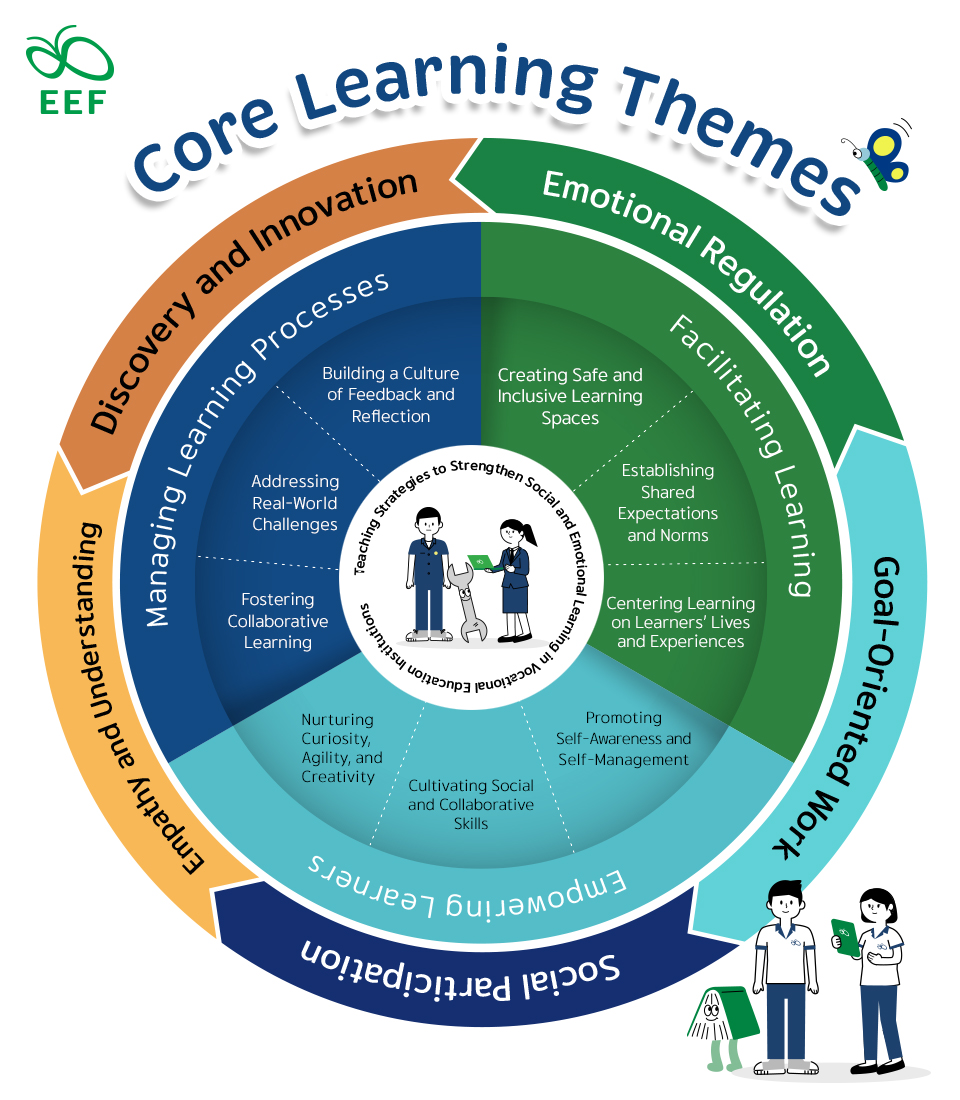
The Equitable Education Fund (EEF) Thailand, in collaboration with the Office of the Vocational Education Commission (OVEC) and the World Bank, organized a workshop under the project “Social and Emotional Learning in Vocational Education and Training (SELVT)” at IMPACT Forum, IMPACT Muang Thong Thani, from October 7–8, 2025. The initiative aims to strengthen the capacity of vocational teachers to effectively integrate Socio-Emotional Learning (SEL) into classroom practice through an immersive program combining conceptual understanding, practical tools, and modern teaching techniques. The workshop also provided opportunities for participants to exchange insights with World Bank experts and build collaborative networks among educational partners, paving the way toward elevating Thai vocational education to international standards. Participating in this seminal event were Mr. Sanga Taechuasai, Deputy Secretary-General of the OVEC; Mr. Koji Miyamoto, Senior Economist at the World Bank; and Mr. Patanapong Sukmadan, Assistant Manager of the EEF, along with vocational teachers and more than 25 institutional leaders from across the country.

During the opening session, representatives from all partner organizations reached a shared consensus on the significance of the SELVT initiative. Mr. Sanga Taechuasai highlighted that this workshop marks a vital collaboration to empower vocational teachers—from strengthening their knowledge base and equipping them with modern teaching tools and techniques, to facilitating exchanges with global experts and fostering teacher networks at both national and international levels—so they can holistically develop learners’ potential. “Lead Teachers” serve as a vital mechanism in transferring knowledge and fostering development, across three essential skills: academic, vocational, and socio-emotional, enabling learners to pursue meaningful careers and lead fulfilling lives. This effort is projected to nurture over 900,000 skilled individuals nationwide, sustainably boosting Thailand’s competitiveness and embedding lifelong learning of foundational skills.

Mr. Koji Miyamoto further emphasized the crucial role of teachers as catalysts for social transformation. The successful integration of SEL into classrooms hinges upon strong partnerships between educational agencies and teachers to create meaningful, engaging, and effective learning experiences. The SEL concept began gaining international attention about two decades ago, when the Organization for Economic Co-operation and Development (OECD) first introduced it. At the time, even advanced educational systems—such as those in Finland, the United Kingdom, and South Korea—were still unfamiliar with the idea. SEL instruction has been proven to enable learners to effectively develop their potential. Over the past two decades, it has become an integral part of teacher development programs across OECD countries, setting a new global standard in education. Today, Thailand, he remarked, is embarking on its SEL journey, marking a pivotal moment in the transformation of its education system.

In his closing remarks, Mr. Patanapong Sukmadan stressed the importance of human capital as the driving force behind Thailand’s escape from the middle-income trap. The SELVT initiative is an extension from the EEF’s “High Vocational Innovation Scholarship” program, launched in 2019, which provides opportunities for students from economically disadvantaged or physically challenged backgrounds to unlock their potential, enabling them to become self-reliant while sustainably supporting their families and communities. Research shows that vocational students with lower socio-emotional skills often face greater barriers to entering the labor market. To address this challenge, SELVT aims to unlock the potential of underprivileged and special needs learners by strengthening their socio-emotional competencies. Investing in these skills is expected to generate returns of up to 11 times, reinforcing the EEF’s mission to reduce educational inequality through systemic reform. As part of the event, a certificate ceremony was held to honor lead teachers, acknowledging their vital role in advancing SEL within vocational institutions nationwide.


The SELVT workshop is part of an ongoing research effort to test and refine tools and training processes for building SEL capacity among teachers. The curriculum is organized into three main modules: facilitating learning, empowering learners, and managing learning processes. Each activity was designed to engage participants in self-reflection, peer discussion, group collaboration, writing, dialogue, and movement, fostering self-regulation, goal orientation, social participation, empathy, and creative discovery.

In the era of Industry 5.0, where digital technology and artificial intelligence work in tandem with human labor, socio-emotional competence has become a critical driver of youth and workforce competitiveness. A 2024 national survey revealed that a large proportion of young people and workers lack essential foundational skills—reading, digital, and socio-emotional skills—resulting in an average monthly income gap of 6,300 Thai Baht between low- and high-skilled workers, and an economic loss equivalent to 3.3 trillion Thai Baht, or roughly 20% of Thailand’s GDP.
Through initiatives such as the “High Vocational Innovation Scholarship” and “Social and Emotional Learning in Vocational Education and Training,” the EEF and OVEC are investing in the human capital of youth from the country’s poorest households. These programs not only expand access to vocational education but also pave the path toward a future-ready, high-skilled workforce by embedding SEL within vocational curricula. The five core SEL competencies—emotional regulation, goal-directed behavior, social engagement, empathy, and curiosity—empower learners to adapt to change, collaborate effectively, and innovate in the 21st-century workplace.
Research indicates that students participating in SEL programs demonstrate 11–12% higher academic achievement. Moreover, every 1 U.S. dollar invested in SEL yields an average return of 11 U.S. dollars in long-term social and economic benefits. Ultimately, SEL development not only enhances the quality of Thailand’s skilled labor force and reduces inequality, but also fosters a generation of resilient, adaptive, and community-driven young people—capable of driving sustainable national development.

